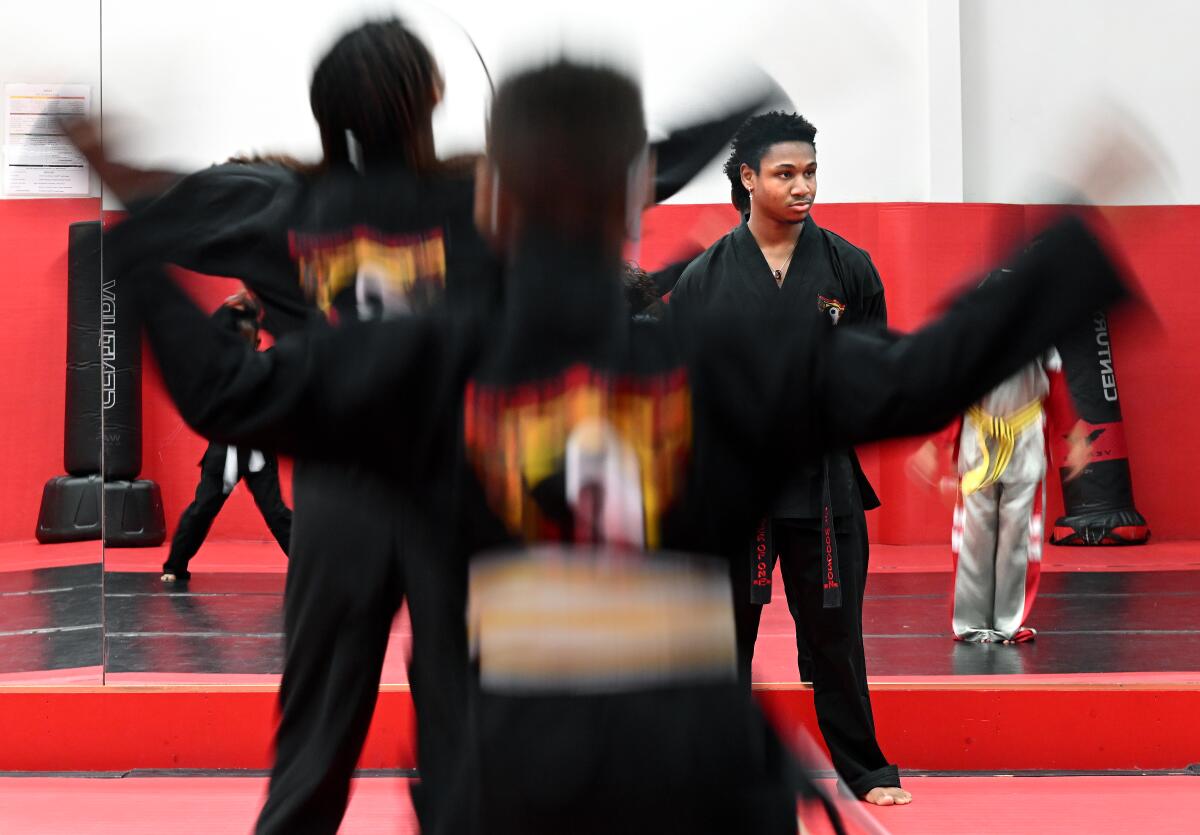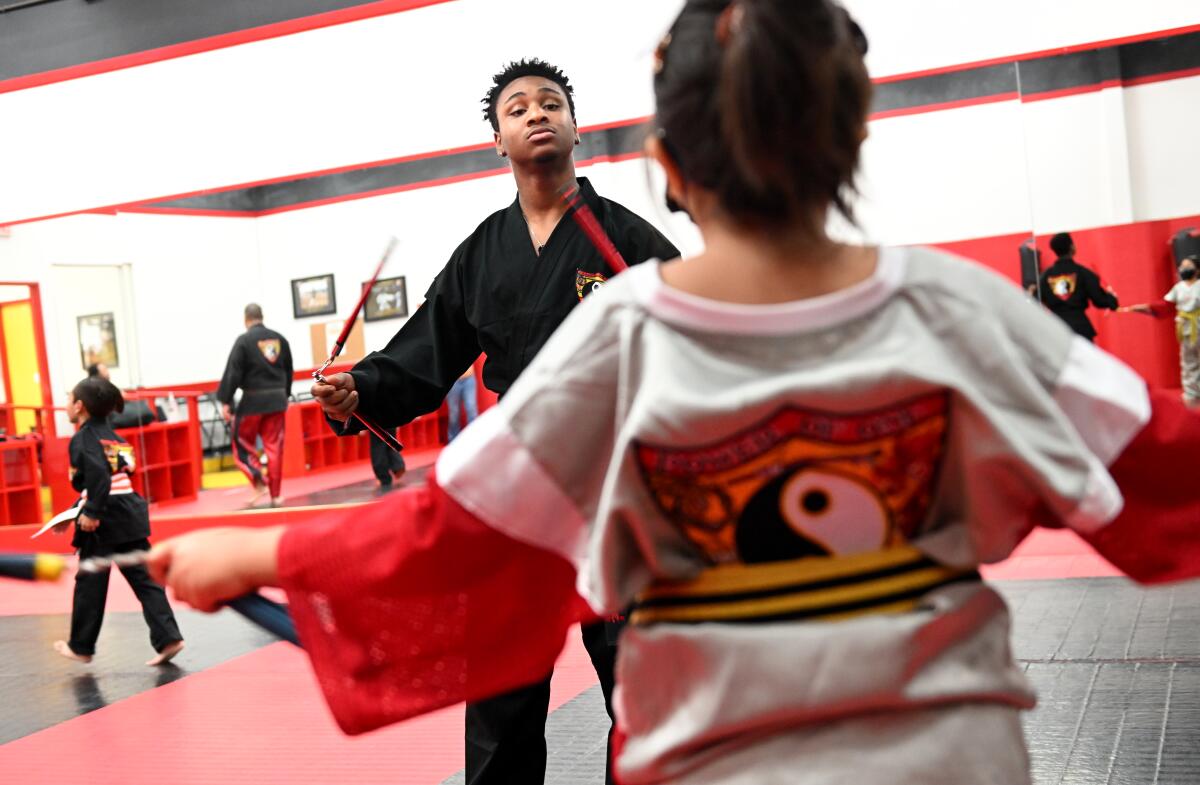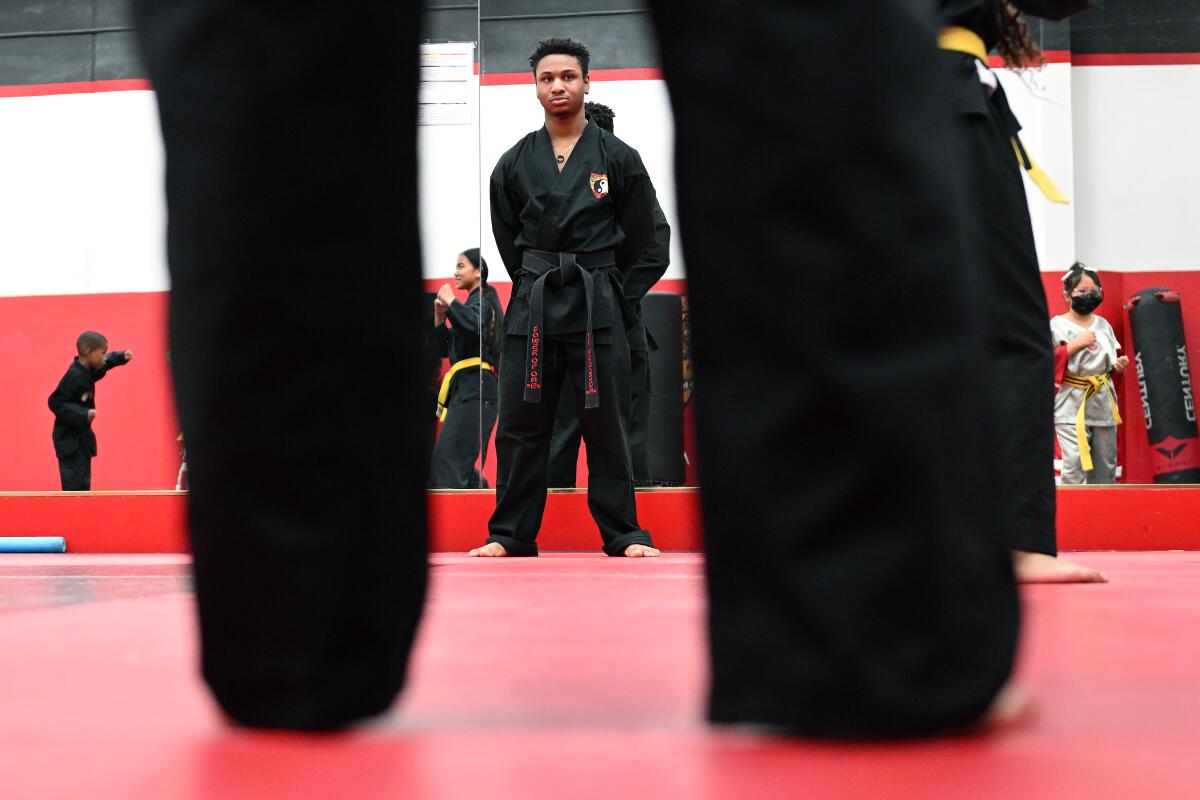Amid youth mental health crisis, teens ask for a kinder college admissions process

By most measures, 18-year-old Gregory Woodson is a success. He works 20 hours a week as a martial arts instructor in Carson, keeps up his grades and has strong, open-minded friendships.
Yet as he plans for college, one word often lurks in his mind: failure.
“It’s horrifying,” Woodson, a senior at Harbor Teacher Preparatory Academy in Wilmington, said. “It’s a lot of pressure because I feel like I have to choose now. I have to figure out what I want to do exactly.”
Woodson and his fellow members of the Class of 2023 have spent their winter months rushing — to research financial aid, create pros and cons lists for schools they want to attend, and brainstorm scholarship and admissions essays, all the while trying to prevent the stressful shadow of college applications from blocking out the sun.

In recent years, that’s only gotten harder. The pandemic has exacerbated the stress of college applications because distance learning-induced isolation — as well as concerns over fitting back in at school or bringing home COVID-19 — have taken a toll on teen mental health.
“I’ve spoken with young people across our country who feel weighed down by tremendous pressure that is affecting their mental health and well-being,” U.S. Surgeon General Dr. Vivek Murthy said in a statement. “For many of them, one important source of such stress is the college admissions process which they describe as being less about growth and exploration and more about checking boxes and fitting into a narrow definition of success.”
It is a laborious and distressing experience for many students, especially those whose families never attended higher education or lack the money to pay to improve their children’s chances of getting into selective schools.
Students whose families can afford it may hire private college counselors, consultants who charge between $850 to $10,000 for a comprehensive package, to help their chances of getting into top schools, according to the Independent Educational Consultants Assn. But for those who cannot, the process remains taxing.

“Whether it be the application itself or whether it be understanding that we’re moving from adolescence truly into young adulthood, where we’re going to be much more independent, all of that weighs on mental health,” said Josh Godinez, a high school counselor who serves on the the California Assn. of School Counselors board of directors.
Seniors say the college application process harms their mental health in multiple ways. For one, it makes them feel as if they have to be perfect.
“You need to have a really good SAT score, you need to have really good grades, and you need to be excellent in pretty much every field that you’re in,” Burbank High School senior Matthew Baker said. “So that’s something that I always think about. I’m like, ‘Am I good enough to be attending these schools?’”
Baker is his school’s varsity basketball captain and an avid volunteer, regularly putting in hours through the California Scholarship Federation and the Leukemia & Lymphoma Society. He wants to attend one of the University of California campuses, Cornell or Columbia. His goal is to major in psychology so he can become a psychiatrist and support people in need.

Even Baker, who is arguably turning in a promising application, said the college expectations of parents and classmates are daunting, and the stress imposed at school by well-meaning adults can be overwhelming.
“It’s sort of similar to social media in a way,” Baker said. “A problem that a lot of teens have is, we start comparing. A lot of times I compare myself to other students in my grade who are also very, very talented and excellent. Sometimes [I think] they’re way, way more qualified than I might be. That can be really mentally taxing.”
Baker is far from alone. Almost two-thirds of teens ages 13 to 17 — 61% — say they feel a lot of pressure to get good grades, according to a Pew Research Center survey. Academics was by far the biggest pressure point found in the survey, with about half as many teens saying they felt a lot of pressure to look good (29%) and to fit in socially (28%).
As someone who recently went through the college admissions process, UCLA freshman Cheyenne Fernandes understands the difficulties seniors face.
Fernandes applied to 25 colleges before getting into seven.
“With the college application process, I was very stressed because this is the accumulation of 12 years of hard work going into an essay and an application,” said Fernandes, a first-generation college student. “They calculate it and sometimes deem your worth based on an acceptance, which is quite daunting.”
Many students echoed the need for support, not pressure, from school faculty and teachers.
In a recent survey by the California Assn. of School Counselors, more than 35% of students surveyed said their schools should provide more support through individual academic advising. Godinez said counselors can help provide valuable resources and support for college.
It can make a big difference.
“We set [students] up for [their] post-secondary plans,” Godinez said. “School counselors are the ones that are uniquely positioned to support [students] through all of it and we take great pride in making sure that we do, day in and day out for our students.”
Myla Westbrooks, a senior at Narbonne High School in Harbor City, said guidance from family and those at school has dramatically reduced her worries about college and her career. She said she wants to go to a community college and major in culinary arts, become a chef and open her own restaurant.
“I’m excited that it’s my last year [of high school],” Westbrooks said. “And going to college, I don’t know how I feel about that. I’m kind of scared. But it’s a new level of education and I’m excited for that.”
Cal State Northridge freshman Genesis Hernandez said waiting for decisions to roll in was difficult. However, she said she received excellent support from staff and peers at John Francis Polytechnic Senior High School in Sun Valley, which helped ease her nerves as a first-generation college student.
“I was kind of nervous and scared because I didn’t know what I was expecting,” Hernandez said. “But I feel like we did have that help.”
Woodson said the support of his friends has been crucial during this process, especially because they’re “all in the same boat.”
“It’s just about knowing who fits [my] environment and who fits the mindset and what’s overwhelming,” Woodson said.
Woodson hopes to attend Cal State Northridge, Pepperdine University or Cal State Long Beach. He said he wants to major in business.
“I wish people understood that we’re still kids at the time,” Woodson said. “We’re still experiencing life. We still don’t know what we want to do, but there’s that pressure being put on that we need to figure out our lives at 17, 18, 19.”
Delilah Brumer is a senior at Daniel Pearl Magnet High School in Lake Balboa. She is the print editor in chief at the Pearl Post and was an intern for the Times’ High School Insider program, which creates opportunities for students to immerse themselves in the field of journalism. After high school, Brumer will attend Northwestern University as a journalism major, with hopes of becoming an investigative journalist.
Times staff writer Teresa Watanabe contributed to this report.
More to Read
Sign up for Essential California
The most important California stories and recommendations in your inbox every morning.
You may occasionally receive promotional content from the Los Angeles Times.










